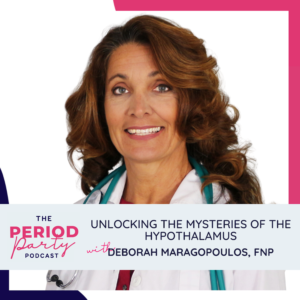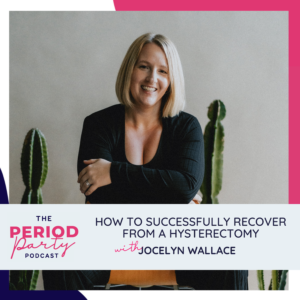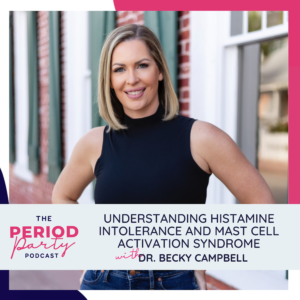It’s fair to say that the subject of poop, and especially girls and women and pooping, is a little taboo.
I don’t know about you, but this topic was extremely embarrassing for me to talk about for a very long time. As a teenager living in gut health hell, I was too embarrassed to use the bathroom at school and instead tried to suffer through it until I got home. No way would I risk someone being in the stall next to me hearing what was happening!
On top of the social issues, keeping poops as a don’t ask-don’t tell topic meant I had no idea that my digestive issues were linked to all my hormonal woes. Here’s the thing – we have to talk about this stuff because just like periods, our digestive health tells us a lot about our bodies but we won’t know when something is wrong if we don’t even know what is normal, to begin with. Let’s push through the discomfort and start talking.
This episode is brought to you by Nutrisense, a provider of continuous glucose monitors. Visit Nutrisense.io and use my code NICOLE25 for $25 off your first month.
A Nutrisense CGM is an incredible way to monitor your blood sugar levels in real-time and their app helps you see exactly how your diet and lifestyle specifically affect your blood sugar. I tried a Nutrisense CGM this past summer and it was a game-changer. It was amazing to see how my meals and specific foods were affecting me positively or negatively. There was a whole lot of experimentation while using it to see what worked best for me and some foods were real shockers. Now you can get a Nutrisense CGM and take $25 off your first month of service. This includes two CGMs to be used for two weeks each, the app, and a month of free dietitian support. That support is invaluable and the best part of the service.
If you want to get your hands on a CGM, head to Nutrisense.io and use NICOLE25 for $25 off your first month.
Episode Details
I have a blog post on my site called Periods and Poops that has been one of my most popular blog posts for many years. Not surprising when you consider that the subject of poop, and especially girls and women and pooping is a little taboo.
I don’t know about you, but this topic was extremely embarrassing for me to talk about for a very long time. As a teenager I lived in gut health hell—that was basically my experience of high school and college. Chronic constipation was the worst of it. It was normal for me to go four or five days, sometimes up to a week, without having a bowel movement. I experienced perpetual bloating, serious heartburn issues, and nonstop stomachaches. Like so many women, I suffered from all of these problems all the way into my early twenties, yet had no clue it was linked to underlying gut issues, chronic system-wide inflammation, and all my hormonal woes. No one ever told me that this was all really bad, and I never thought to ask because I was SOO mortified by the whole thing.
Here’s the thing – we have to talk about this stuff because just like periods which are also off-limits in many societies, we won’t know when something is wrong if we don’t even know what is normal to begin with.
Of the women I see in my practice, about 90 percent have some kind of gastrointestinal challenge, ranging from food sensitivities and allergies to leaky gut, chronic constipation, diarrhea, and IBS. This is hardly surprising given that your body needs adequate quantities of vitamins, minerals, and antioxidants to create hormones, which means that at the end of the day, you are only as healthy as the food you can digest and absorb. You can eat an impressive array of high-quality foods, but if your gut isn’t functioning optimally, it won’t make much difference to your hormones. Unless you can break that food down and deliver its essential nutrients to the rest of your body, your diet can’t help you.
I walk you through the ins and outs of the gut-hormone connection but here’s a little breakdown of bowel movements and the secrets they can reveal about our hormones.
You may have always considered this topic gross, inappropriate, and highly embarrassing but it just gives you some insights into your period troubles.
When it comes to educating women about their health, poop is one subject that is just not discussed enough. And because no one talks about it, women have no idea it’s not normal to use the bathroom only a few times a week, or to need to run to the bathroom after meals.
The brain directs the digestive process. In fact, the vagus nerve, the main line running from your brain to your digestive system, oversees the entire process of rest and digest. When you experience heightened emotional or physical stress, the fight-or-flight response kicks in, and suddenly digestion is low on the body’s list of priorities. The cortisol produced by the adrenal glands in response to stress changes how the gut works, disrupting the entire digestive system, from the brain to the gut barrier to the microbiome.
In fact, sustained high levels of cortisol actually increase gut lining permeability, which will lead to Leaky Gut Syndrome, which is a condition in which the gut barrier becomes inappropriately leaky or too leaky. This means that larger food particles and other substances can leak through the gut lining into the bloodstream where they don’t belong. And from there, they cause all kinds of havoc in the body.
Usually, one of the first signs of stress impacting digestion is bowel movement irregularities. When you’re in survival mode, your body isn’t focused on absorbing and using the nutrients you’ve just consumed, and it certainly can’t think about the next trip to the bathroom. Instead, it either dumps that food real fast (diarrhea) or holds on to it (constipation) for a later time, when things have calmed down.
If you don’t go to the bathroom daily, your overall toxic load goes up. This in turn hinders hormonal production and equilibrium. It can also lead to an imbalance in gut bacteria that changes the way you process estrogen.4 However, diarrhea that comes on after a meal or that has you running to the bathroom frequently isn’t okay, either. Loose stools let us know that we aren’t digesting and absorbing nutrients well, which can be detrimental to our health and hormones in the long run.
When I think back to my childhood, there was definitely messaging (some subliminal, some overt) that girls didn’t poop or fart. All that grossness was for the boys, not for girls. I remember holding number 2’s in at school til I got home because I was so uncomfortable going to the bathroom with the potential of other people being in the stall next to me. I have no idea when it started but I definitely remember it throughout primary school and all through high school.
Then during my teenage years, to add on to all this weird poop shame I was a complete stress case. My dad had died in a plane accident when I was 11 and the mental and emotional fallout of that traumatic event was pretty catastrophic for our family. While you may not have had such an extreme experience in your childhood, I encourage you to think about how you feel about bowel movements and why you have those opinions about this subject. Where did they come from? If you have digestive issues, when did they start? Have they gotten worse over the years?
I’d say these are really good questions to ask yourself when it comes to figuring out what’s going on with any aspect of your health that you might be struggling with, not just your bowel movements! But once you can begin to recognize the source of the issue, you can begin the healing process.
So, what’s happening with YOUR poop? Whenever you go to the bathroom, I want you to get in the habit of recording your bowel movement’s texture, color, and smell, and note the presence of any undigested food, how long it took you to excrete, and how long it has been since your last bowel movement. Ideally, you should have at least one bowel movement each day that is:
- one long, smooth piece that is easy to pass;
- medium-brown with no visible food particles; and
- not putrid-smelling, sticky, or greasy.
If your bowel movements don’t look like this or you experience any constipation or loose stools, pay close attention to what changes you notice when you go through the protocol in the fix your period book. Your poop will be the perfect indicator of what’s happening in your gut and hormonally, and what changes need to be made or sustained to reduce inflammation and experience better periods.
Speaking of hormones. Now that you have a bit of a primer on digestion in general, let’s change gears and talk about how your menstrual cycle affects this vital process!
Periods and poops
When we talk about the psychological and physiological changes we experience in each phase of our cycle, our poop tends to get overlooked, but our menstrual cycle has a very direct and predictable effect on our GI tract.
- Do you feel constipated after you ovulate?
- Do bouts of diarrhea seem to come out of nowhere right before and during your period?
- Do you feel like the only time you have somewhat normal poops is during your follicular phase?
It’s extremely common for women to have regular bowel movements in the first half of their cycle known as the follicular phase, but then, as soon as ovulation hits and progesterone levels begin to rise, they get constipated until their period comes.
Why do we have normal bowel movements in the follicular phase?
The bowel moves stool and waste (wish there was a better word for that!) through the intestines using a process known as peristalsis.
Through peristalsis, muscles lining the bowel contract and relax in a rippling, wave-like motion to move things through the intestines.
As estrogen rises in the first half of your cycle, it also increases smooth muscle contractions in the digestive tract. This will keep things moving in the follicular phase.
Then in the Luteal Phase estrogen drops pretty significantly and progesterone takes over.
One of the properties of progesterone is that it’s a muscle relaxant. In fact, it’s commonly given to pregnant women to delay labor and preterm birth because it can effectively reduce uterine muscle contractions.
When your muscles are relaxed, it becomes more difficult for the bowel to contract, thus making it harder to move things along. As your progesterone levels drop in the day or two before your period, your constipation should subside.
And as many of you know, things can change pretty drastically when your period actually begins.
This progesterone drop triggers an inflammatory response that releases a large amount of prostaglandins, hormonelike substances which stimulate muscle contractions in the uterus and cause your uterine lining to shed.
Prostaglandins exist in all human tissue, and different types of prostaglandins do different things. For example, prostaglandin E2 and F2 stimulate inflammation, contract uterine muscles, and constrict blood flow to the damaged area to prevent blood loss. Higher levels of prostaglandins will cause more severe uterine contractions, which can lead to the painful cramps that are familiar to many of us.
Due to its close proximity to the uterus, the bowel is one of the first organs to be affected by prostaglandins. Once they infiltrate the bowel, their effect is the same as it is in the uterus. They influence bowel contractions, and you might end up with loose stools or diarrhea right before your period begins or on the first day of bleeding. Sometimes it is much-needed relief after weeks of constipation.
But too much of a good thing is a bad thing. When you have excess prostaglandins, one bowel movement could turn into being stuck in the bathroom all day. And this is a problem. This is oftentimes why women will have diarrhea and painful periods combined, and even painful ovulation.
This is because prostaglandins play a role in ovulation too. They rise during this time of the cycle to facilitate the release of the egg from its follicle. So they’re not necessarily bad, but they become problematic when levels rise too high due to ongoing inflammation. What’s new right? Everything seems to be tied to inflammation!
So what can we do. The first thing is we all need to work on is reducing our overall inflammation and that requires us to focus in on our gut function and make sure we’re not eating foods that are triggering a cycle of inflammation. Then we need to support our gut lining and microbiome. All of this is laid out in Week 3 of the program in the book. We also need to make sure our liver is firing on all cylinders. There are two phases of liver detoxification, which both need a variety of nutrients to work properly. If they don’t have the right raw materials hormones and other toxins won’t be sufficiently broken down and you’ll run into problems. I outline how to do all of this in week 4 of the program in the book.
While progesterone may predispose you to constipation in the second half of your cycle, and its subsequent drop before your period might mean loose stools or crazy diarrhea, just know that once you start healing your gut and your liver, you’ll likely begin to see an improvement in both of these super- disruptive problems.
So, do you notice any of these things happening during your menstrual cycle? To get a clear picture of your own specific digestive changes throughout your cycle, I recommend that you track your bowel movements so that you can isolate these patterns. Most period tracking apps have a feature that allows you to include this kind of information so I recommend using these tools to help you demystify your bowel movements. That way you’ll know what to expect during each phase of your cycle.


